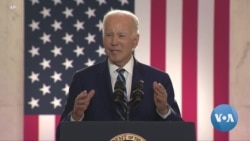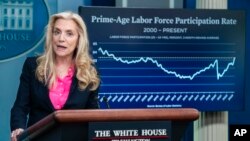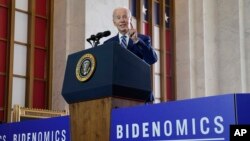WASHINGTON - Ahead of his 2024 reelection campaign, President Joe Biden is making the case that his policies to "grow the economy from the bottom up and the middle out" have succeeded in taming inflation and lowering unemployment.
During a speech Wednesday in Chicago to promote an economic vision the White House has dubbed “Bidenomics,” the president touted what he said was the highest economic growth among the world’s leading economies since the pandemic.
“We’ve added over 13 million jobs, more jobs in two years than any president has added in a four-year term,” he said. “And folks, that’s no accident. That’s Bidenomics in action.”
He summed up his economic agenda in three pillars: making smart investments in America, educating and empowering American workers to grow the middle class, and promoting competition to lower costs and help small businesses.
Ahead of his speech, his aides have promoted the term, highlighting slowing inflation and an unemployment rate that has remained below 4% since February of this year.
"The share of working-age Americans in the workforce is higher now than it has been for 15 years," Lael Brainard, director of the White House National Economic Council, said Tuesday during a news briefing. "While we have more work to do, inflation has been coming down for 11 months in a row."
Recent economic indicators give the administration reasons to be hopeful. While inflation still poses a challenge, employers continue to hire, and consumer prices rose at a slower pace in May compared with the previous year.
But so far, most Americans do not share the administration’s optimism. The most recent Ipsos poll showed Biden's approval rating remaining steady in the low 40s. The economy remained a top concern, and most were pessimistic about the direction of the country, a fact that Republicans have been eager to underscore.
"It's frankly staggering to me that the president continues to have the audacity to say things like 'hardworking families are reaping the rewards' of his policies," Senate Republican Whip John Thune said earlier this month. "Hardworking families are certainly reaping something from the president's policies, but it isn't rewards."
Former President Donald Trump, who has declared another run in 2024, slammed Bidenomics as “high taxes, crippling regulations, crushing inflation, war on American energy, soaring energy costs, job-killing globalist international agreements like the Paris Climate Accord, and total economic surrender to China and other foreign countries. America First economics vs. America Last.”
Disconnect from data
The disconnect between economic data and how people are feeling about their financial well-being may be attributed to the fact that Americans are not digesting the good news, said Ipsos spokesperson Chris Jackson. He pointed to a survey measuring Americans’ familiarity with positive economic developments such as low unemployment and falling inflation versus bad news such as supply chain issues and high inflation.
"The bad news, everyone knows about. The good news, very few Americans know about," he told VOA. "In an environment like that, it's hard to make a compelling case that you're doing a good job, when nobody knows anything that’s good."
The disconnect is part of the reason Biden is taking his economic message on the road to try to convince Americans the economy is thriving under his leadership.
Biden’s speech is part of a three-week push in which top officials will travel across the country to argue that legislation championed by the president is delivering results for Americans. This includes massive investments under the infrastructure law, the COVID-19 relief package, and the CHIPS and Science Act that injects upward of $52 billion into semiconductor research, development, manufacturing and workforce development.
Republicans contend some of the administration's policies are too costly and contribute to high inflation. They say that most of the job gains since 2021 were simply jobs that were being recovered from the pandemic, not new job creation.
The decision to brand the country's fortunes with the president's name reflects the administration's confidence that the trajectory is upward and the economy will not fall into recession – at least before November 2024 when the presidential election will be held.
Biden appeared to somewhat distance himself from the term, though, saying it was the press who coined it.
“I never called it 'Bidenomics,' ” he said as he departed the White House for Chicago on Wednesday. “I don’t go around beating my chest, ‘Bidenomics.’ ”
Last week, the Federal Reserve paused its aggressive rate hike campaign for the first time in 18 months but signaled the battle against inflation isn't over. More interest rate hikes are likely, even as early as July.
Move over, Reaganomics
Bidenomics is also an attempt to distinguish the president's and the Democrats’ agenda from that of Republicans, who favor cutting taxes and cutting government spending.
Biden repeated his criticism of former Republican President Ronald Reagan's agenda of lowering tax rates, deregulation and reducing spending on government programs. Since the push for Reaganomics in the 1980s, Republicans have credited low taxes with boosting corporate profits and ultimately all workers and the population in general – a theory some call “trickle-down economics.”
Trickle-down economics has failed time and again, has increased inequality, and has seen jobs go overseas and towns hollowed out, Biden said. He added that 40 years of such policies have limited the American dream “except for those at the top.”
Tax policy is just one area where Biden faces intense opposition. Just two weeks ago, Republicans in the U.S. House of Representatives unveiled a series of new tax breaks aimed at businesses and families, a proposal that would reverse some of his legislative victories.
Katherine Gypson contributed to this report.







